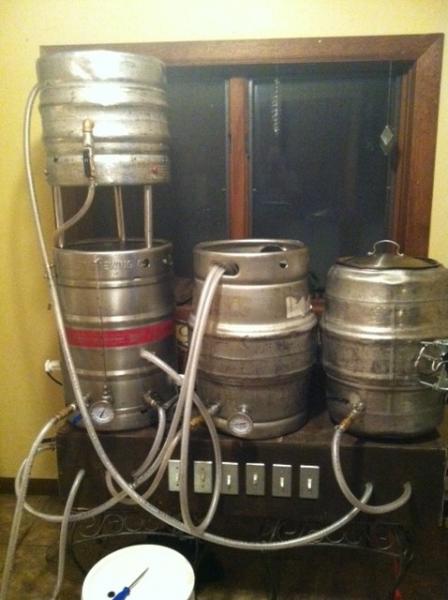Last night I confirmed my findings from my first time with batch sparging, meaning I hit 75% efficiency again. This should be the end of my HLT teetering precariously on a chair above my mash tun (NYC Brewing, baby!). I shall miss climbing onto my chopping block to peer into the HLT to see how much freaking longer my fly sparge would be. Fare thee well.
You are using an out of date browser. It may not display this or other websites correctly.
You should upgrade or use an alternative browser.
You should upgrade or use an alternative browser.
See Ya Fly Sparge
- Thread starter bmick
- Start date

Help Support Homebrew Talk - Beer, Wine, Mead, & Cider Brewing Discussion Forum:
This site may earn a commission from merchant affiliate
links, including eBay, Amazon, and others.
benbradford
Well-Known Member
I have always batch sparged and average in the 70's as far as efficiency... Last brew was a wit beer and called for a long protein rest at 122 followed by an hour at 150, and efficiency went up to 82%... Don't know if that was the cause or not yet.
This is my apartment brewing setup

This is my apartment brewing setup

I've always fly sparged but recently I did two beers doing batch sparging and I got really good efficiency and all, and it was easier and quicker, but my beer was a LOT darker than it should have been. There's a lot of debate on this subject but that's really the biggest difference I can tell. Obviously if efficiency is an issue that's cheap to offset with extra grain.
- Joined
- Nov 6, 2008
- Messages
- 660
- Reaction score
- 9
I've always fly sparged but recently I did two beers doing batch sparging and I got really good efficiency and all, and it was easier and quicker, but my beer was a LOT darker than it should have been. There's a lot of debate on this subject but that's really the biggest difference I can tell. Obviously if efficiency is an issue that's cheap to offset with extra grain.
Why would batch sparing affect the color of the beer?
L
Well, my guess is that when you add the sparge water after laudering, it stirs up the grain quite a bit, rinsing almost all of the color off as compared to fly sparging where the grain bed stays static through laudering and sparging. Of course, recirculation greatly helps to remedy this.
I have always batch sparged and average in the 70's as far as efficiency... Last brew was a wit beer and called for a long protein rest at 122 followed by an hour at 150, and efficiency went up to 82%... Don't know if that was the cause or not yet.
This is my apartment brewing setup
I gotta say that is pretty bad ass. Best apartment setup I think I have ever seen. I live in a house so I brew in my garage and/or driveway but friends ask "How can I get into doing this? I live in an apartment" and I just don't know what to tell them other than stove-top extract batches.
This is the first time I have ever heard color change mentioned as a difference between batch and fly sparging.
- Joined
- Nov 6, 2008
- Messages
- 660
- Reaction score
- 9
Well, my guess is that when you add the sparge water after laudering, it stirs up the grain quite a bit, rinsing almost all of the color off as compared to fly sparging where the grain bed stays static through laudering and sparging. Of course, recirculation greatly helps to remedy this.
This sounds very unlikely to me. Just sayin'. My batch-sparged wheat beers and blonde's are pretty light in color.
L
benbradford
Well-Known Member
I was under the impression that fly sparging would actually do a better job of rinsing the grains than batch sparging. So the opposite would be correct.
I've always batch sparged and my efficiency is always bewteen 72-76%. Saves so much time compared to doing a fly sparge.
Pivovar_Koucky
Well-Known Member
You can get 80-90% efficiency batch sparging depending on your crush, water, etc. Plus its super easy.
Righlander
Well-Known Member
ive never fly sparged. course my efficiency is usually like 65%
I was under the impression that fly sparging would actually do a better job of rinsing the grains than batch sparging. So the opposite would be correct.
This what all the books say and I can't disagree with that, I have just noticed a difference but that's with my setup and everyone's is different. There may be no difference at all and maybe I just think there is, who knows. I have had good luck doing both so even though I usually fly sparge, I wouldn't really say that overall one method is any better than the other.
Similar threads
- Replies
- 25
- Views
- 4K
- Replies
- 67
- Views
- 6K
- Replies
- 8
- Views
- 1K
- Replies
- 43
- Views
- 2K

